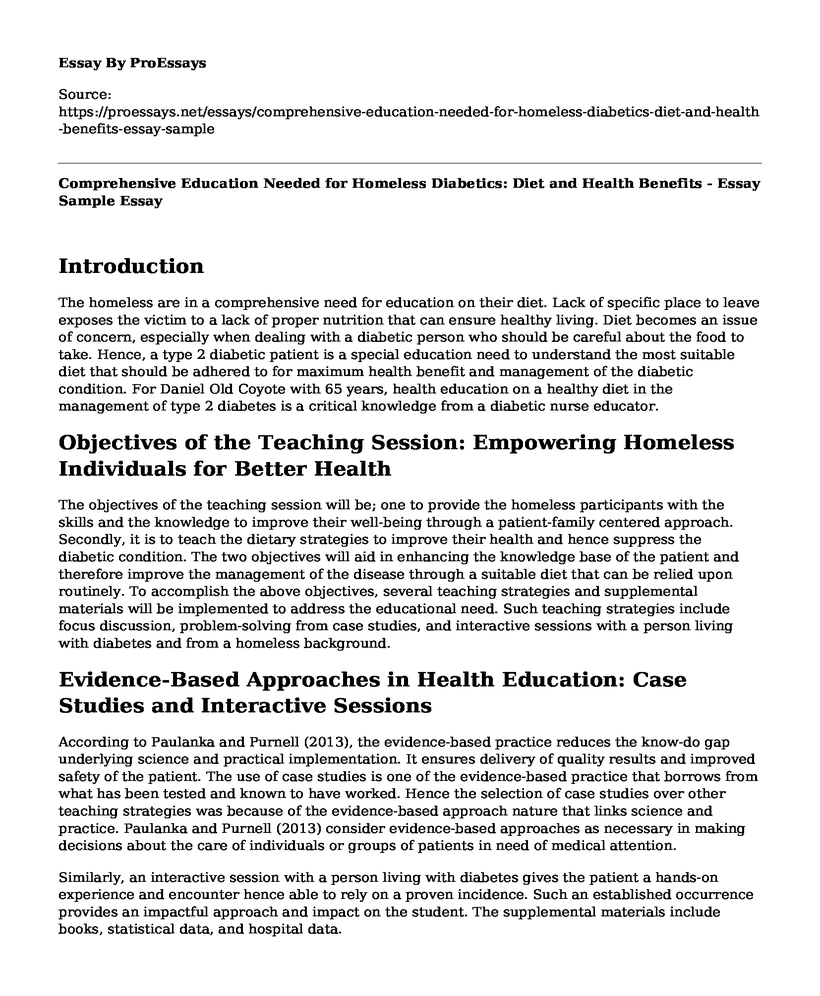Introduction
The homeless are in a comprehensive need for education on their diet. Lack of specific place to leave exposes the victim to a lack of proper nutrition that can ensure healthy living. Diet becomes an issue of concern, especially when dealing with a diabetic person who should be careful about the food to take. Hence, a type 2 diabetic patient is a special education need to understand the most suitable diet that should be adhered to for maximum health benefit and management of the diabetic condition. For Daniel Old Coyote with 65 years, health education on a healthy diet in the management of type 2 diabetes is a critical knowledge from a diabetic nurse educator.
Objectives of the Teaching Session: Empowering Homeless Individuals for Better Health
The objectives of the teaching session will be; one to provide the homeless participants with the skills and the knowledge to improve their well-being through a patient-family centered approach. Secondly, it is to teach the dietary strategies to improve their health and hence suppress the diabetic condition. The two objectives will aid in enhancing the knowledge base of the patient and therefore improve the management of the disease through a suitable diet that can be relied upon routinely. To accomplish the above objectives, several teaching strategies and supplemental materials will be implemented to address the educational need. Such teaching strategies include focus discussion, problem-solving from case studies, and interactive sessions with a person living with diabetes and from a homeless background.
Evidence-Based Approaches in Health Education: Case Studies and Interactive Sessions
According to Paulanka and Purnell (2013), the evidence-based practice reduces the know-do gap underlying science and practical implementation. It ensures delivery of quality results and improved safety of the patient. The use of case studies is one of the evidence-based practice that borrows from what has been tested and known to have worked. Hence the selection of case studies over other teaching strategies was because of the evidence-based approach nature that links science and practice. Paulanka and Purnell (2013) consider evidence-based approaches as necessary in making decisions about the care of individuals or groups of patients in need of medical attention.
Similarly, an interactive session with a person living with diabetes gives the patient a hands-on experience and encounter hence able to rely on a proven incidence. Such an established occurrence provides an impactful approach and impact on the student. The supplemental materials include books, statistical data, and hospital data.
Advantages and Disadvantages of Case Studies and Interactive Sessions
The case studies are advantageous in that they provide an evidence-based approach making the entire topic practical (Shah, 2014). The disadvantage of the case studies is that they may not apply to the patients being taught. The interactive session with a person living with diabetes is advantageous because it provides a real case scenario hence making it more of a reality than fiction. However, it is disadvantageous because the students might apply it as it is without putting it into the context of their condition. The Purnell Model for Cultural Competence underpins the selected teaching methods since they focus on achieving a culturally competent community that relies on an evidence-based approach.
Conclusion
As a diabetic nurse educator, the evaluation of the effectiveness of the teaching methods would be evaluated using role-playing, a skills test, and simulation. Through role-playing, the educator can understand whether the student gained and owned the information taught and hence if they can translate them into practice. Role-playing is the mapping of the learned skills into the real world, and this allows one to evaluate the extent to which the skills and knowledge were transmitted during classroom teaching.
References
Paulanka, B. J., & Purnell, l. (2013). Transcultural health care: A culturally competent approach. F.A. Davis
Shah, J. H. (2014). Improving diabetes care in the clinic. New Delhi: Jaypee Brothers Medical Publishers (P) Ltd.
Cite this page
Comprehensive Education Needed for Homeless Diabetics: Diet and Health Benefits - Essay Sample. (2023, Apr 19). Retrieved from https://proessays.net/essays/comprehensive-education-needed-for-homeless-diabetics-diet-and-health-benefits-essay-sample
If you are the original author of this essay and no longer wish to have it published on the ProEssays website, please click below to request its removal:
- Health History and Screening of an Adolescent or Young Adult Client Paper Example
- Poverty: Proposing Solution Essay Example
- Gender Wage Gap and Other Labor Market Difference Between Men and Women Paper Example
- Responses on Assignments About Cancer and Public Health
- Nurses: Chemical Impairment Risks to Safety & Patient Care - Essay Sample
- Literature Review Example on Defending Free Speech: ACLU's Role in Achieving Equality
- Paper on Normal Microflora & Opportunistic Infections: Causes of Candidiasis







